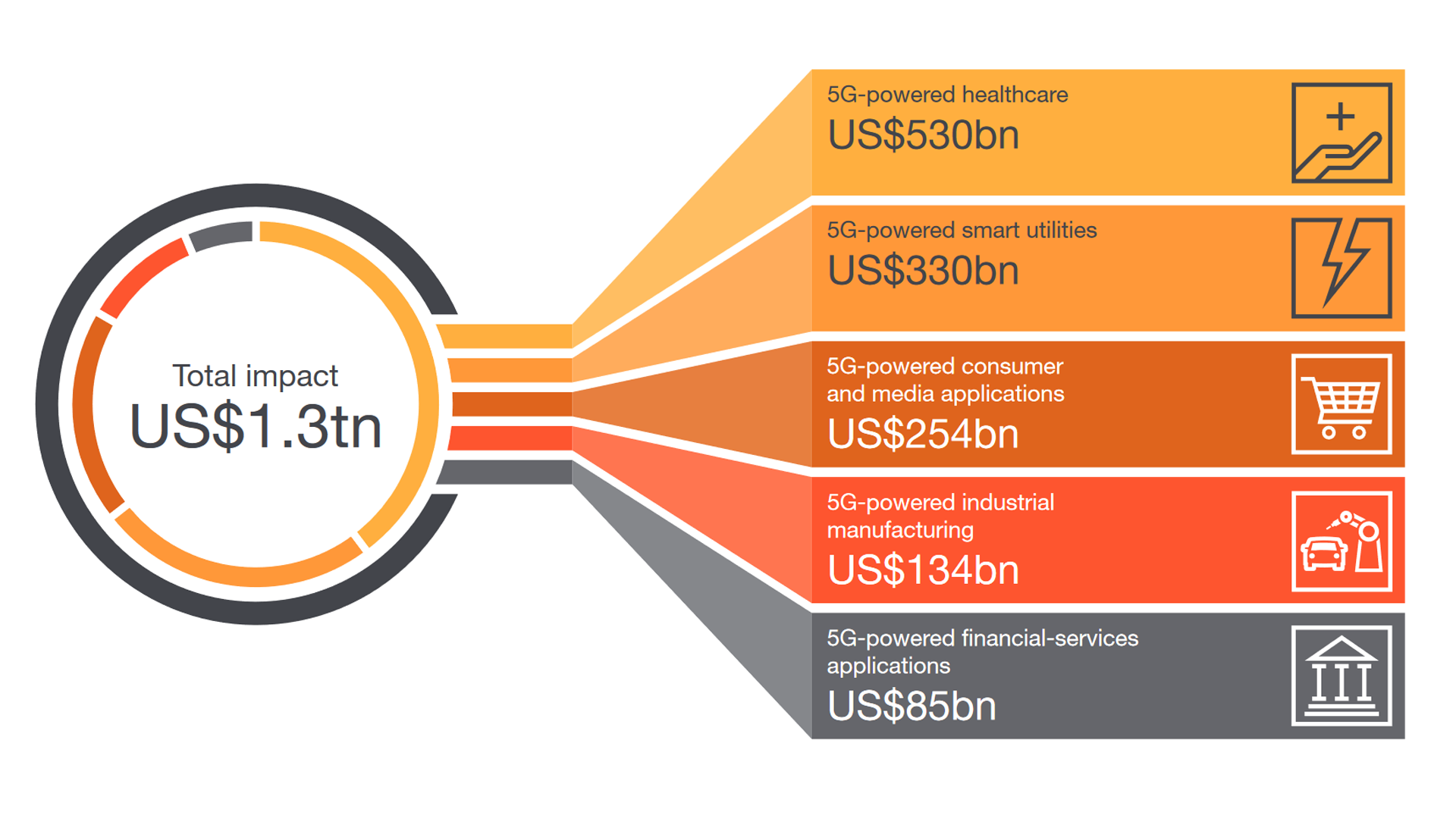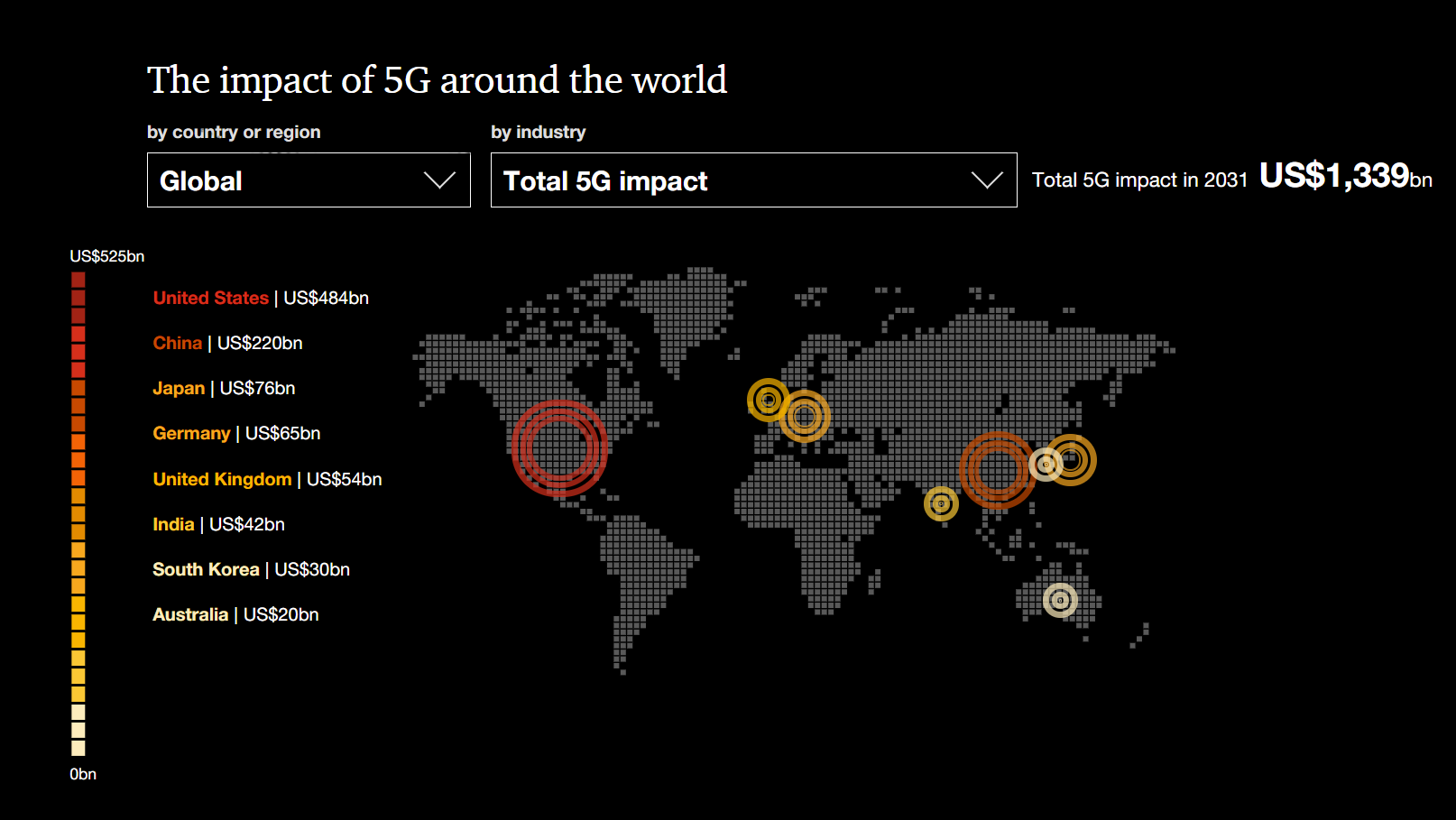5G will add $1.3tn to global economy by 2030, says PwC report
According to a new report from PwC, by the year 2025, 5G will have a huge impact on global GDP, with a period of aggressive growth resulting in gains of $1.3tn dollars by 2030.

Get up to speed with 5G, and discover the latest deals, news, and insight!
You are now subscribed
Your newsletter sign-up was successful
A new piece of 5G research from PwC has claimed that by the year 2030, 5G technology will contribute More than one trillion dollars in global GDP, with the US and UK accounting for $484bn and $54bn respectively.
The report, titled ‘The global economic impact of 5G’, found that productivity and efficiency gains will drive 5G adoption, but it’s in the health and social sectors that 5G is expected to provide the biggest uplift.
According to the report, over half the global economic impact (US$530bn) will be driven by the transformation of health and social care within the next decade, with 25 percent coming via smart utilities in energy, water and waste management.
“More than 80% of the economic potential appears to lie in healthcare applications (projected to contribute US$530bn to global GDP)."
Wilson Chow, PwC China.
“The absolute figures can only be directional and are most interesting when looked at in relation to one another,” explained Wilson Chow, a global partner at PwC China. “More than 80% of the economic potential appears to lie in healthcare applications (projected to contribute US$530bn to global GDP), smart utilities management (an additional US$330bn), and consumer and media applications (US$254bn more).
“Smaller contributions from the other industries in our study bring the total estimated uplift to US$1.3tn,” Chow explained. “As leaders contemplate the decade ahead, 5G demands strategic attention—both to where and how it can create competitive advantages, and to the implementation and integration imperatives that must be met for it to generate value.”
Some sectors will fare better than others
Looking at specific sectors, the report found that the USA and Australia are projected to gain the most from financial services applications, whereas India will benefit from smart utilities, with China and Germany gaining most in manufacturing. The report said that the following areas will specifically benefit from 5G:
- SMART utilities management applications: these will support environmental targets to reduce carbon and waste through enabling combined smart meters and grids to deliver energy savings, and improving waste and water management through tracking of waste and water leakage (US$330bn).
Get up to speed with 5G, and discover the latest deals, news, and insight!
- Consumer and media applications include: over the top (OTT) gaming, real time advertising and customer services (US$254bn)
- Manufacturing and heavy industry applications include: monitoring and reducing defects, increased autonomous vehicle use (US$134bn)
- Financial services: applications will include those reducing fraud and improving customer experiences (US$86bn)
Energising the global economy in 2025
The report claims that the next five years will see modest returns for 5G, as the technology continues to roll out across the globe, but following this period of development countries that have adopted 5G can expect to see huge gains.
"Starting in 2025, we project these investments will have an increasingly energising effect on the global economy, as 5G-enabled applications become more widespread.”
Wilson Chow, PwC China.

“For the next five years, 5G’s contribution to economic growth will be fairly modest, as telecom companies focus on infrastructure construction and rollout,” the report stated. “But starting in 2025, we project these investments will have an increasingly energising effect on the global economy, as 5G-enabled applications become more widespread.”
Based on the study, the USA (US$484bn), China (US$220bn) and Japan (US$76bn) will experience the largest uplift as a result of 5G technology applications, due to the size of their economies and strong modern industrial production sectors.
“With the pandemic accelerating digitalisation across all sectors, 5G will act as a further catalyst,” Chow concluded. “It will emerge in this decade as a fundamental piece of our societal infrastructure and as a platform for driving the competitiveness of national economies, new business models, skills and industries.”
- Why 5G small cells are vital for mmWave 5G
- Get updates on the hottest 5G stocks
- Discover the truth behind 5G dangers
- 5G towers: everything you need to know
Dan is a British journalist with 20 years of experience in the design and tech sectors, producing content for the likes of Microsoft, Adobe, Dell and The Sunday Times. In 2012 he helped launch the world's number one design blog, Creative Bloq. Dan is now editor-in-chief at 5Gradar, where he oversees news, insight and reviews, providing an invaluable resource for anyone looking to stay up-to-date with the key issues facing 5G.

